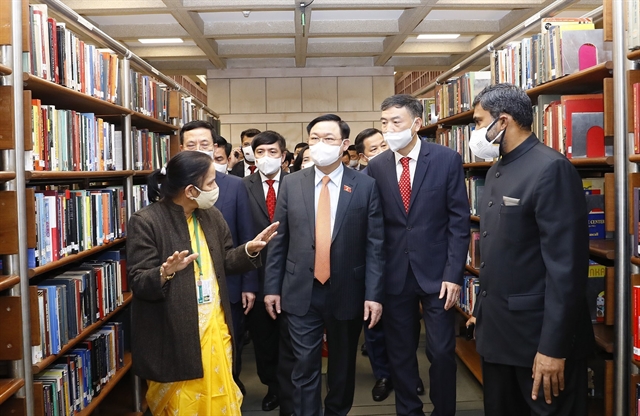.jfif) Opinion
Opinion

The current visit of the high-level delegation led by Vương Đình Huệ, the Chairman of the Vietnamese National Assembly indicates the political convergence and unanimity of views cutting across party lines in Indian politics.

|
| NA Chairman Vương Đinh Huệ (centre) and the Vietnamese delegation visit the Parliament Library of India on Thursday. VNA/VNS Photo Doãn Tấn |
Rup Narayan Das*
The current visit of the high-level delegation led by Vương Đình Huệ, the Chairman of the Vietnamese National Assembly indicates the political convergence and unanimity of views cutting across party lines in Indian politics.
India and Việt Nam enjoy a cultural and civilisational connect spanning over centuries. There are many remnants and relics of this linkage between the two countries. Several scholarly studies suggest that the two countries have had strong bilateral relations for over 2000 years. It is believed that Hindus who had emigrated from India to Việt Nam between the 2nd and 15th century AD had established the Hindu Kingdom of Champa. Indian culture entered the region of Indochina including Việt Nam without any resistance from the natives. The seamless cultural assimilation between India and Việt Nam resonates even today, thereby providing a comfort level between the two Governments and their peoples.
The enduring philosophy of Buddha and the linkage with Champa civilisation have impacted the life and outlook of the people of the two countries. There is a convergence of ideas of the Vietnamese leaders and Indian leaders like Mahatma Gandhi and Pandit Deen Dayal Upadhyaya. The leaders of our two countries have always cherished and endeavoured for the welfare and wellbeing of the people. There is a great deal of similarity between the philosophy of late President Hồ Chí Minh and the idea of 'integral humanism' of our renowned thinker Deen Dayal Upadhyaya. In fact, integral humanism forms the basis for sustainable development as it espouses indigenous economic models that place the human being at the centre stage of growth.
Political Convergence
People of India hold Việt Nam and Vietnamese people in very high esteem for their tenacity and heroic struggle against imperialism and colonialism. The strategic bonding between India and Việt Nam can be seen through the prism of India's protracted struggle against colonialism and imperialism. Both suffered colonialism and imperialism and heroically fought against them. There is a very high degree of empathy notwithstanding the ideological difference. Vietnamese leaders like President Hồ Chí Minh and General Võ Nguyên Giáp are household names to people of India who grew up during the tumultuous years of Việt Nam’s struggle against imperialism and colonialism. The tested and trusted historical, cultural and political ties between the two countries and their leaders have not only sustained the relationship between the two countries, but have also elevated it to high strategic level.
India even prior to her Independence has been paying careful attention to the development in Indochina in which Việt Nam occupied most critical space. India's anti-colonialism and anti-imperialism stance resonated in its engagement with Việt Nam. India's eagerness to engage with Indochina can be discerned from the fact that it invited the leaders of Việt Nam including the legendary Hồ Chí Minh to represent Việt Nam at the Asian Relations Conference in 1947. India took a keen interest on the unfolding grim situation in Indochina particularly the heroic fight of the Vietnamese people against French colonialism.
The historic Central Hall of Indian Parliament has hosted a number of high dignitaries including Presidents and Prime Ministers of some of the India's friendly countries. The galaxy of dignitaries include President of US Barak Obama, Prime Minister Shinzo Abe of Japan. This select list of distinguished Presidents and Prime Ministers also include Prime Minister of Socialist Republic of Việt Nam Phạm Văn Đồng, who addressed the Members of Indian Parliament in the historic Central Hall of Indian Parliament on 24 February, 1978.
Exchange of Parliamentary delegations between the two Parliaments is a regular feature of robust bilateral relationship between the two countries. Sumitra Mahajan, the former Speaker of Lok Sabha had visited Việt Nam in 2015 to participate in the 132nd Assembly of the Inter-Parliamentary Union held in Hà Nội. A Parliamentary Delegation led by Nguyễn Thị Kim Ngân, Chairwoman of the National Assembly of Việt Nam had visited India in December, 2016.
There is a Parliamentary Friendship Group in Indian Parliament. It is expected that the current visit of the high level parliamentary delegation will give a further impetus to the bilateral relationship between the two countries.
* Rup Narayan Das is a former joint secretary of the Lok Sabha secretariat of Indian Parliament and currently a senior fellow of Indian Council of Social Science Research.




